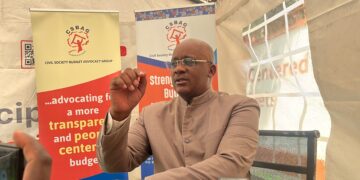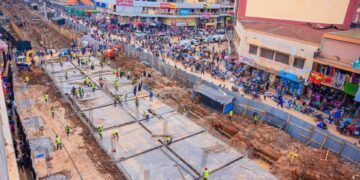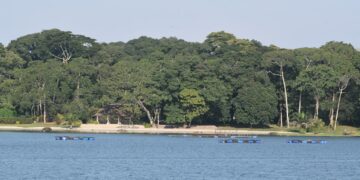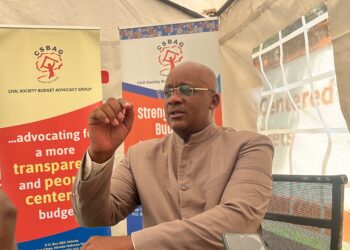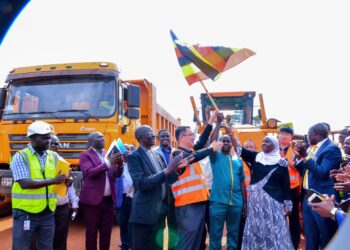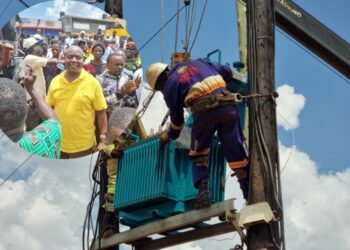Two traders’ associations have dragged businessman Hamis “Ham” Kiggundu and his company, Kiham Enterprises, to court over what they describe as illegal construction activities along the Nakivubo Channel, accusing the developer of contributing to severe flooding in downtown Kampala.
The case, filed on Monday before the Civil Division of the High Court, also lists the National Environment Management Authority (NEMA) and Kampala Capital City Authority (KCCA) as respondents for allegedly failing to enforce environmental and urban planning laws on the contested project.
The petitioners — Kampala Arcaders Traders Association (KATA) and UNATA Traders Association Uganda Limited — are seeking court orders to halt the works, declare them illegal, compel removal of debris from the drainage channel, and secure compensation for losses they claim stem from flooding caused by the development.
Floods Destroyed Business Premises
According to the court documents, traders operating around Nabugabo Street say the project has intensified flooding, damaging merchandise and jeopardizing businesses housed in several arcades including French Plaza, Total Plaza, Jambole Plaza, Pentagon Arcade, Capital Arcade, BMK Plaza, PAPAZ Plaza, BBC Plaza, 888 Plaza, Shauriako, and Channel Street.
The traders argue that Kiggundu’s works have obstructed the flow of the Nakivubo Channel — a key stormwater drainage system for the central business district — exposing thousands of businesses to avoidable risk.
The dispute traces back to a proposal Kiggundu reportedly submitted to President Yoweri Kaguta Museveni on July 25, 2025, seeking permission to cover the drainage channel to address sanitation issues and persistent blockages.
The President is said to have endorsed the plan, directing the Prime Minister to facilitate the project.
However, the petitioners contend that the presidential directive did not override legal procedures and that the construction proceeded without mandatory environmental impact assessments or approvals from NEMA and KCCA — rendering it unlawful.

Traders Claim Authorities Failed in Their Duty
Through their legal representatives, M/s Luzige, Lubega, Kavuma & Co. Advocates, the traders say they made several attempts to engage Kiggundu and relevant authorities.
They also petitioned Parliament, prompting discussions with KCCA officials under the Committee on Commissions, Statutory Authorities and State Enterprises (COSASE) in August 2025.
Despite these engagements, the traders allege that no meaningful action has been taken, accusing NEMA and KCCA of negligence in protecting public infrastructure.
“Our fight is not merely against an individual,” the petition states, “but for the soul of Kampala’s future — a city where development respects the environment and safeguards livelihoods.”
KCCA Blames Heavy Rains
In a separate statement issued Sunday, KCCA dismissed claims that ongoing construction works alone caused the flooding, attributing recent flash floods to unusually heavy rainfall.
The Authority noted that while upgraded drainage systems in areas such as Lubigi, Nakamiro, Soya–Bunga, and Kibuli have improved water flow, flooding still occurred around the Nakivubo Channel and near the Old Taxi Park.
KCCA Executive Director Hajjati Sharifah Buzeki said engineering teams, supported by police and National Water and Sewerage Corporation (NWSC) personnel, have been deployed to clear blocked drains and support affected businesses.
Lord Mayor Wants Prosecution
Kampala Lord Mayor Erias Lukwago has sided with the traders, accusing Kiggundu of “blatant impunity” and urging authorities to prosecute him.
“This is not just about commercial interests. It is about human safety and respect for public infrastructure,” Lukwago said, promising to rally behind affected traders.
Court Action Pending
Kiggundu has not yet officially responded to the allegations. The High Court is expected to allocate the matter to a judge once preliminary filings are reviewed.
The outcome of this case could set a critical precedent for development practices around Kampala’s fragile urban drainage network — and for the balance between private investment and environmental protection in the capital.

